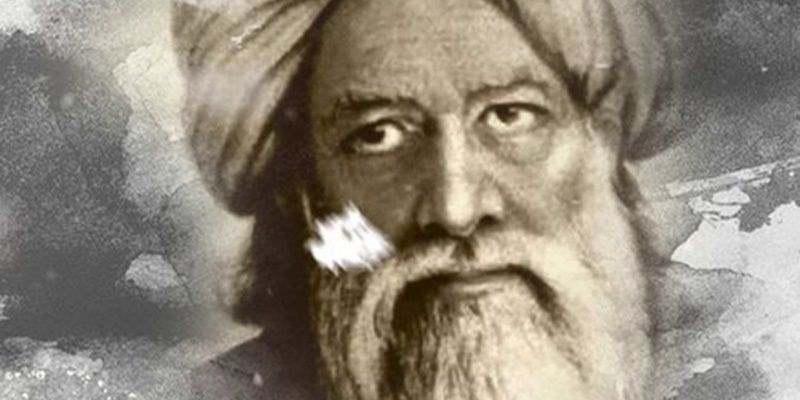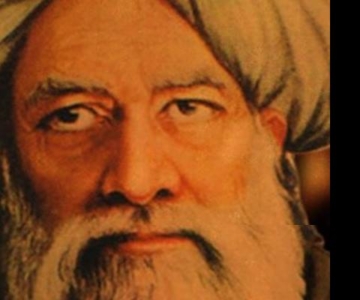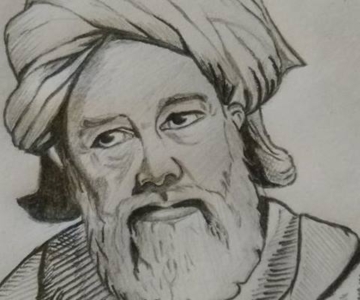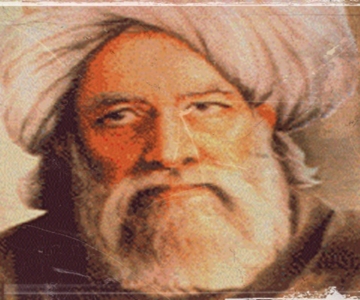Dr Manzur Ejaz writing for the TFT
According to myth, if perfectly sung by a master, the classical raga Malkauns can set a river on fire. And if you want a description of Malkauns personified, it would be the tall red-eyed jogi or Ustad Chote Ghulam Ali Khan. In a freshly laundered, blazing white and starched kurta-pajama, Khan Sahib was a well dressed and handsome man even in old age. Despite his appearance, Khan Sahib was at heart a jogi who had wandered and meditated in the limitless jungle of classical music his entire life.
Both Bade Ghulam Ali Khan and Chote Ghulam Ali Khan belong to this gharana. They were cousins with identical names but because one was older he was known as precisely that, Bade, and the younger as Chote. The classical singers of the Qasur gharana are sometimes called Qasur kay qawwal bankay (children of Qasur qawwals) because their forefathers were traditional qawwals at the shrine of Baba Bulleh Shah.
Khan Sahib worked hard to enhance Samina Hussain Syed’s skills in classical music because she had a very powerful, deep and melodious voice that constitutes the core of a classical singer. In fact, she had more potential than anyone else in the world of music at that time. Khan Sahib knew her potential and that is why he would come daily for her training; it was never just for the money.
Akhtari Bai Faizabadi, whom Khan Sahib romanced
 Muhammad Rafi, famous Bollywood singer, learnt his craft from Chote Ghulam Ali Khan
Muhammad Rafi, famous Bollywood singer, learnt his craft from Chote Ghulam Ali Khan
 Samina Hussain Syed singing with Ustad Chote Ghulam Ali Khan on the harmonium
Samina Hussain Syed singing with Ustad Chote Ghulam Ali Khan on the harmonium
 Ustad Chote Ghulam Ali Khan at Samina Hussain Syed’s home in Lahore
Ustad Chote Ghulam Ali Khan at Samina Hussain Syed’s home in Lahore
One day I asked Khan Sahib why Samina was not performing on public platforms when she has the best classical singing voice around. Slightly disappointed, Khan Sahib replied, Mian, dhidh nahin bajha hoya ais naal (Young man, this is not her means of livelihood). He meant that she came from an aristocratic high caste Syed family and did not need music to make her living.Khan Sahib was right and that is probably why Samina Hussain Syed never scaled the heights of classical music despite her talent. However, because Samina learnt well and for a long time with the greatest of ustads, Chote Ghulam Ali Khan, she is one of Pakistan’s best trained persons in classical music and she can educate a whole new generation because of her proficiency in English, Urdu and Punjabi. In addition, she has enhanced her knowledge and singing skills in Sufi music. She is an institution in herself and can introduce new generations to music.
There was a time when I, too, became Khan Sahib’s pupil. I presented the ritual sweets to him as my ustad, and a rakhi thread was tied to my wrist. But I was a complete failure as a student because I had neither the talent nor was I driven by a desire to live and die by music. However, Khan Sahib still saw in me a person who was devoted to his culture and as such, took me under this wing. Over the years, I had many interesting interactions with him. Talking of his cousin Bade Ghulam Ali Khan, he whispered that he never finished a raga from the beginning to the end. He used to get bored quickly singing a raga and would revert back to thumri, Chote Ghulam Ali Khan added. Thumri is considered to be of a lower level of music compared to khayal which is the singing of traditional ragas.
He once told us that Bade Ghulam Ali khan had hired a Hindu pandit to teach his son, Ustad Munawwar Ali Khan. Bade Ghulam Ali used to keep a check on their sessions by eavesdropping. It is amusing to think of Bade Ghulam Ali Khan with his ears glued to the closed doors of his son’s training room.
One day when both stalwart cousins were playing cards, Bade Ghulam Ali said Listen, how well Munawwar is singing. Chote Ghulam Ali Khan was outraged and complained to him, We try our utmost to sing well and you never give us a nod and here your half-trained son and you adore him.
Chote Ghulam Ali Khan spoke to me a few times about his romance with the renowned thumri and ghazal singer, Akhtari Bai Faizabadi (or Begum Akhtar). According to Khan Sahib, he took part in a classical music concert and delivered himself of a disappointing performance. When the concert ended Akhtari Bai, standing by the exit, was inviting all the singers home for dinner, except Khan Sahib whom she ignored. He was heartbroken and taunted Akhtari Bai, Bibi, one does not become a classical singer by singing thumris or ghazals. And sometimes classical masters cannot grasp the ragas. It is always touch and go.
Akhtari Bai was very embarrassed; she apologised and invited Khan Sahib to join the dinner and perform as well. Mian, that night my voice touched the heights of classical music, recalled Khan Sahib. He used to say that when in his youth he sang under thundering skies he thought he could overwhelm the thunder with his tans. The performance at Akhtari Bai dinner was one such performance. As a result of that evening, she was powerfully attracted to him and followed him to Lahore. She tried to convince him to move back with her to India. Khan Sahib would end the story at that, leaving his listener in suspense.
This reminds me of another occasion when Ustad Salamat Ali Khan taunted the renowned ghazal singer Mehdi Hasan in a concert which was being attended by professional singers and a few of their admirers in the Lahore Town Hall in the mid-60s. Khan Sahib took us along but we had to be satisfied with the back seats. Ustad Salamat Ali was performing and after his every difficult taan Ustad Salamat Ali Khan was known for the most tedious and complicated taan he would stop and address Mehdi Hasan, Khan Sahib, this is for you. Ustad Chote Ghulam Ali Khan started laughing and whispered, Salamat is a rascal; he is shaming and challenging Mehdi Hasan to reach that level.
On another such occasion at the Pakistan Arts Council hall, I heard Chote Ghulam Ali Khan and Ustad Salamat Ali Khan arguing. The question at hand was, should Ghulam Ali, the new ghazal singer, be given a chance to sing a thumri or not. Ustad Chote Ghulam Ali Khan was pleading his namesake’s case The poor kid just wants to sing a thumri and we should allow him. After a lengthy discussion Ustad Salamat Ali Khan conceded half-heartedly. That evening almost every classical singer of the Punjab tried to do his or her best because, again, it was a sort of competition among professional classical singers. However, that night Ghulam Hussain Shaggan out-performed and outshone every one. Until that evening’s performance, classical singers did not take him as one of their own because of his background. His father Bhai Lal Hussain was a gurdwara singer before the Partition, in that he sang at Sikh temples. However, Chote Ghulam Ali Khan generously conceded that, Shaggan has sung better than everyone else. I remember that after that evening and recognition by an Ustad like Chote Ghulam Ali Khan, Ustad Ghulam Hussain Shaggan’s star was on the rise.
One day Khan Sahib told me that the famous Indian playback singer, Mohammad Rafi, was his student too. I asked Khan Sahib if Rafi would admit that if asked! Khan Sahib, irked by my question said Mian, what difference does that make? He does not do what I do (classical singing).
For all that, Khan Sahib was deeply aware of his own accomplishment. He also knew that the intricacies of the raag were lost on lay people like us. One day, when Najam Hussain Syed and I sat before him as he sang, absorbed in his raga, we applauded at the end of it. But he snubbed us, You guys have no idea what I am doing.
Chote Ghulam Ali Khan never became a famous classical singer like his cousin Bade Ghulam Ali Khan. His critics said that his voice lacked sweetness and melody. However, his knowledgeable admirers were convinced that his voice was pure and had tremendous force unlike Bade Ghulam Ali Khan’s artificially decorated voice befitting the courtly tradition of rajas and maharajas. For his supporters, Chote Ghulam Ali Khan represented the repressed but ready to burst out mass culture while Bade Ghulam Ali Khan and other singers of that stature reflected the aristocratic and static version of classical music.
Ustad Chote Ghulam Ali Khan has been forgotten and like many talented Pakistanis he has been ignored as the state has become steadily more dysfunctional and illiberal. The good news is that Samina Hussain Syed has 10 years worth of recordings of Chote Ghulam Ali Khan’s training sessions. In addition, she herself is the embodiment of the Qasur gharana tradition. She should transmit that tradition to new generations. State institutions should invite her and assist her in that endeavour.
I will never forget the night when, on my request, Ustad Chote Ghulam Ali Khan sang only Punjabi asthais and antras till dawn at Dr Ghazala Irfan’s residence in Lahore. But alas, the recording done that evening by the late Hayat Ahmad Khan appears to have been lost. It was a historical night, like the colossus Ustad Chote Ghulam Ali Khan who was at the heart of it.
lives in Virginia



